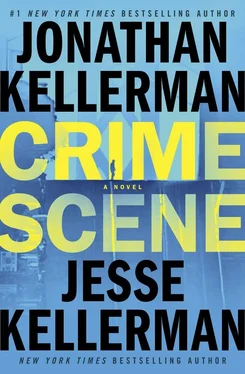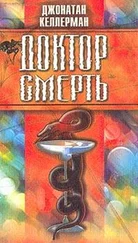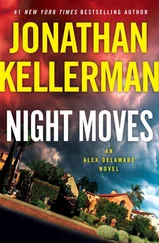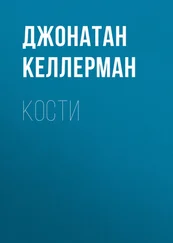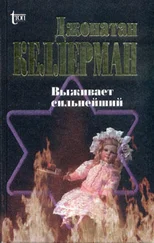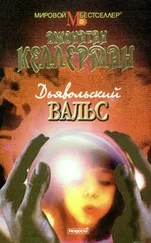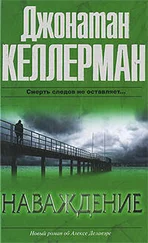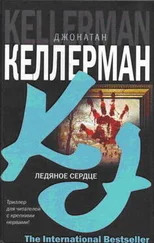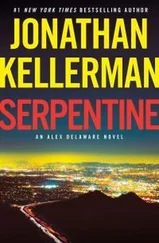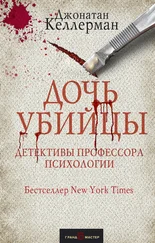“No sir. He never turned it on before.”
I said, “It was your birthday. The code.”
A tangle of emotions passed over the massive face, slow and inexorable as a caravan pressing across the desert.
He said, “I didn’t know that.”
“You did know where he kept the pills, though, in his desk.”
“Yes sir. I didn’t find nothing.”
“You could have come to me, Julian,” Weatherfeld said. “I would’ve helped you.”
Triplett averted his eyes.
“You used to do that,” I said. “Take the bus down, visit people. You stopped.”
He shrugged. “I don’t like it.”
“What don’t you like?”
“The bus,” he said.
“How come.”
“They look at me.”
“Uh-huh,” I said. “I get that. People stare at me, too, sometimes.”
He regarded me quizzically.
“I mean,” I said. “I’m pretty tall.”
For the first time, Triplett broke into a full grin. “Yeah, you ain’t nothing.”
That had us all laughing, and the tension released a notch.
“I spoke to some folks who’re worried about you,” I said. “They haven’t heard from you in so long. Ellis Fletcher?”
Triplett appeared briefly surprised, then shook his head. “I don’t think so.”
“It’s true,” I said. “Your sister Kara, she misses you, too.”
He swallowed hard.
“She’d like to hear from you,” I said.
Rather than answer, he looked to Crahan, who said, “You tell him what you think, JT.”
Triplett said, “I like it fine here.”
I nodded. “Well, sure. Peace and quiet like you got, I’d like it, too.”
He gave another small smile. “Yeah.”
“All right,” I said. “You two discuss it and decide what you want.”
Triplett nodded.
I said, “I want to ask you about the night you and Dr. Rennert left to come up here.”
Silence.
“It was raining,” he said.
“That’s right. Good memory. Did he say why you had to leave?”
“The man got hurt.”
“Nicholas Linstad.”
“Yes sir. Doctor went to talk to him about me, that I ain’t done nothing wrong.”
“Was Dr. Rennert planning to go to the police?”
Mere mention of the police caused Triplett to seize up with apprehension.
“It’s okay,” I said. “Never mind that. What about you? Where were you, that night?”
“Home.”
“At your mom’s.”
He nodded.
“Was anyone with you? Your mom? Was she there?”
He scratched his chin. “I can’t remember.”
“That’s okay,” I said. “You’re doing great. So you’re home. Dr. Rennert shows up.”
“Yes sir. He said to get in the car.”
“He took you someplace in the city, in San Francisco. Is that right?”
“Yes sir. I was there the one night and then doctor said we got to go. The man got hurt, he didn’t want nobody thinking I did it to him.”
“Did he explain what had happened?”
He hesitated.
“Did the two of them have an argument?” I asked.
Again, Triplett looked to Crahan.
“Up to you,” Crahan said.
Triplett said, “He shot him.”
I said, “Renn — Dr. Rennert told you that?”
“No sir. I heard him tell the lady when we was at the house.”
“Lydia,” I said. When Triplett regarded me blankly: “That was the name of the woman whose house you stayed at, Lydia. You overheard Dr. Rennert tell her he’d shot Linstad?”
“Yes sir.”
“Shot him, or shot at him.”
Triplett made a helpless face.
“It’s all right, Julian,” Weatherfeld said. “It was a long time ago.”
She gave me a warning look, and I relented. “We can leave it there for now.”
Triplett’s hands had resumed their fitful dance.
He said, “He was a nice man, too.”
“Dr. Rennert cared a lot about you,” I said. “And I know you cared about him.”
But Triplett was shaking his head. “The other one.”
I grasped his intention. “Linstad?”
“Yes sir,” Triplett said. “He was always nice to me.”
He showed no trace of bitterness. Had Rennert given him the whole truth? Maybe, maybe not. Perhaps, over time, Walter Rennert arrived at the same conclusion that I had, after years of dealing with death: truth, like any vital substance, can be fatal in large doses.
If Julian Triplett could suffer his ordeal while retaining his humanity — his quiet, somber grace — by what right did Rennert or I or anyone else interfere?
Crahan said, “You said you can prove he’s innocent.”
I said, “I can try.”
“How?”
“First thing I need is for Julian to take a DNA test,” I said. To Triplett: “It’s your choice. Nothing’s going to happen if you decide not to do it.”
Crahan said, “We got a lot to think about. Right, JT?”
Karen Weatherfeld said, “Maybe we should let Julian rest.”
She got to her feet, waited for me to follow suit.
“One last thing, before I go,” I said. “I’m going to need you to give me back the other item you took from Dr. Rennert’s house.”
Triplett stared at his twitching hands.
“Nobody’s mad,” I said. “But it belongs to someone who wants it back.”
Triplett said nothing.
“JT?” Crahan said.
“Yeah,” Triplett said. “Okay.”
He got up — I felt the floor dip beneath me — and pointed to a kitchen drawer.
“Excuse me,” he said.
Weatherfeld and I backed out of his way.
The drawer housed a variety of woodworking tools: X-Acto knives, chisels, files. Buried in the mix was Walter Rennert’s .38.
Triplett picked it up by the butt. Pinched in his fingers, it looked like a toy.
Weatherfeld sucked in a sharp breath. “Oh, Julian,” she said softly.
Crahan was on his feet now, too, scowling. “The hell you got that for?”
Triplett shrugged.
“It’s okay,” I said. “You got scared and you grabbed it.”
Triplett nodded.
“We both know you wouldn’t use it.”
“No sir.”
“You don’t need it anymore, though. Right? You’re safe. So can I have it, please?”
Triplett offered me the gun, barrel-first.
“Thanks,” I said, taking it carefully. “I want you to know this, okay? You don’t have to be scared anymore.”
He thought it over awhile, then nodded. “Okay.”
I smiled. “Good.”
We started to go, but Triplett stopped us: “Hold on.”
He rooted in the avocado box, coming up with a piece of wood he liked. Selecting a knife from the tool drawer, he began rapidly to whittle.
He worked inches from me, like a close-up magician. I couldn’t tell what he was making; it was lost in his huge hands. He paused but briefly to inspect the piece from a new angle before resuming with swift, short strokes, shavings spiraling to the floor. The tremors had left him, and he was steady and confident. I could hear the whisper of the blade. His big chest moved up and down like the tide.
Crahan looked on fondly. Karen Weatherfeld watched, rapt.
The strokes slowed. Ceased.
Julian set the knife in the drawer, exchanging it for a crumpled square of sandpaper. He gave the piece several quick wipes, blew dust into the sink, regarded his handiwork with a satisfied smile.
A sunflower.
Start to finish, it had taken him perhaps three minutes.
“Twenty bucks,” Crahan said, “and it’s all yours.”
Triplett pressed the carving into my palm. For an instant his flesh touched mine, and what I felt was smooth and warm, strong and heavy and present, impossible to ignore.
“Kara,” he said.
I said, “I’ll make sure she gets it.”
Nine weeks later, on a balmy Tuesday afternoon, I met Nate Schickman in the lobby of Boalt Hall, the main law school building.
Читать дальше
